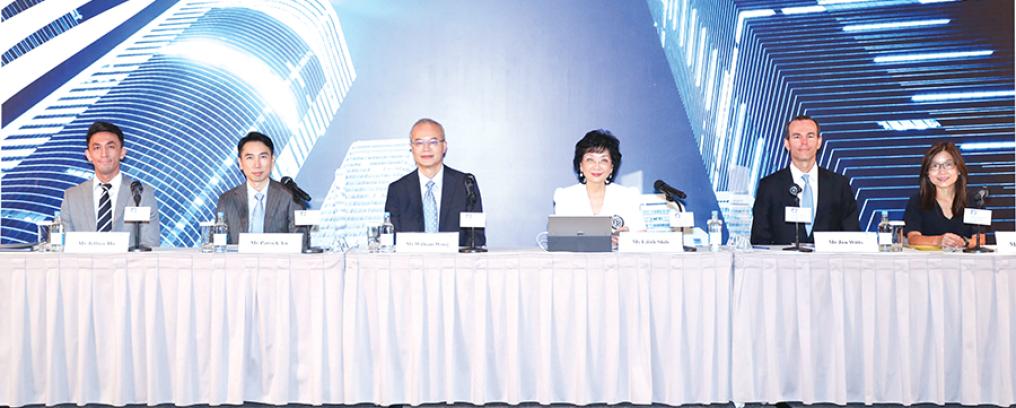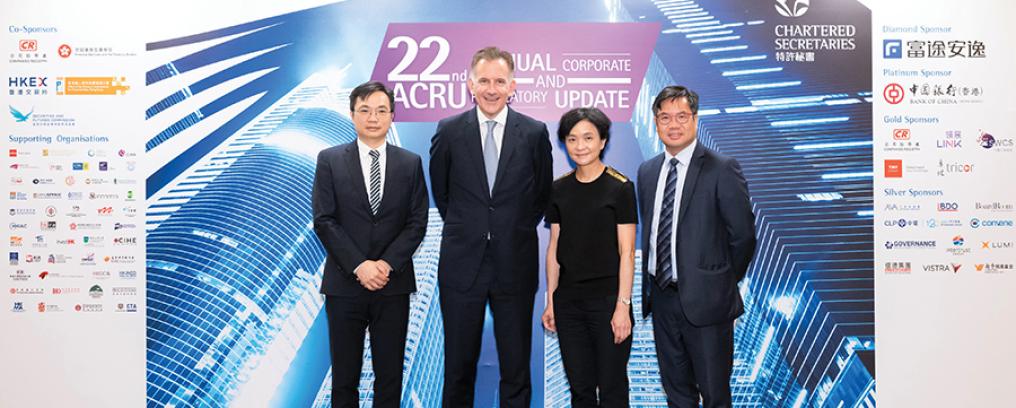Speakers at the 22nd Annual Corporate and Regulatory Update (ACRU) webinar, held by The Hong Kong Institute of Chartered Secretaries on 11 June, emphasised the need for regulators in Hong Kong to find the right balance between high regulatory standards and market development.
ACRU is the most popular CPD event held by The Hong Kong Institute of Chartered Secretaries (the Institute). This year’s event, which continued with the webinar format adopted last year in response to the Covid-19 pandemic, attracted over 2,000 participants and comprised sessions with the following regulatory bodies (in order of appearance):
- Financial Services and the Treasury Bureau
- Companies Registry
- Office of the Privacy Commissioner for Personal Data, Hong Kong
- Hong Kong Exchanges and Clearing Ltd, and
- Securities and Futures Commission.
This edition of
CSj reviews the key themes to emerge from the day’s discussions.
Regulation and market development
The importance of striking the right balance between high regulatory standards to safeguard the quality of the Hong Kong market while minimising the compliance burden for companies and encouraging innovation was the central theme to emerge from the Guest of Honour speech by The Honourable Christopher Hui Ching-yu, JP, Secretary for Financial Services and the Treasury, the HKSAR Government.
‘Speaking of regulation, I’m sure many of you will associate that with compliance restrictions or limitations,’ Mr Hui said. ‘Those are indeed necessary as we have to guard against potential fraud and market misconduct. However, there’s another way of looking at regulation, as it brings trust and reinforces stability in our market, thereby paving the way and sowing the seeds for innovation,’ he said.
Mr Hui cited a number of ways in which Hong Kong has sought to find the right balance between high regulatory standards and market development. The decision back in 2018 to allow pre-revenue biotech companies and companies with weighted voting rights structures to list in Hong Kong, with investor protection measures in place, he pointed out, enabled Hong Kong to benefit from the opportunities to finance the growing number of new economy companies.
Similarly, he cited the latest proposals by the Financial Services and the Treasury Bureau (FSTB) to enhance anti–money laundering and counter–financing of terrorism (AML/CFT) regulation in Hong Kong through the introduction of, among other things, a licensing regime for virtual asset service providers (VASPs) in Hong Kong. The proposed regime will allow foreign-incorporated companies to obtain a licence as VASPs in Hong Kong. ‘This will cast our net wider and attract more foreign players to the Hong Kong market,’ Mr Hui said. He added that, while there are inevitably some compliance costs in meeting the licensing requirements, the FSTB has had feedback from market players that a proper licensing regime will enhance investor confidence and, in turn, help them attract new business.
Mr Hui also cited the Stock Connect and Bond Connect programmes connecting the stock and bond markets of Hong Kong with those of the Mainland as examples of successful regulatory innovation. ‘We have pioneered a model to connect to vastly different markets in a risk controlled manner,’ Mr Hui said. He added that both programmes have opened new investment channels to facilitate increasingly large fund flows. In the first quarter of 2021, turnover of northbound and southbound Stock Connect increased by over 60% and 180%, respectively.
Moreover, the proposed Wealth Management Connect in the Greater Bay Area is a further capital market innovation designed to connect market players and investors in the Mainland and Hong Kong. Government regulators are now working towards the implementation of this programme in the second half of this year. The programme would adopt many regulatory designs used in the various connectivity programmes already launched, including a quota system applicable in an aggregate and individual manner, and a closed loop system to monitor and control fund flows.
Abiding by international standards
The first ACRU session following the Guest of Honour speech featured a presentation by Joseph Chan JP, Under Secretary for Financial Services and the Treasury. Mr Chan further developed the theme of finding the optimum balance between high regulatory standards and cutting the compliance burden for businesses where possible.
He started by highlighting Hong Kong’s advantages as a capital market and international financial centre (IFC). Its core strengths, he said, are its free flow of capital, common law system, independent judiciary, transparent and low tax regime, robust infrastructure support, and, last but not least, a rich pool of professionals. He welcomed the contribution of professional practitioners, including participants of ACRU, to building Hong Kong’s success as an IFC.
He added that Hong Kong has to preserve its reputation as a well-regulated market. ‘We need to make sure that internationally, investors and other jurisdictions are comfortable and confident in our regime and in our regulations. Hong Kong’s sound regulatory system gives confidence to market players that they are on a level playing field. It gives confidence that there will be clarity, that there will be certainty and free and fair competition for everybody,’ he said.
For this reason, while Hong Kong has traditionally maintained a low tax regime, he said, it needs to adapt to the recent initiative by the Organisation for Economic Co-operation and Development (OECD) and G20 to combat tax avoidance. The OECD/G20 Inclusive Framework on Base Erosion and Profit Shifting has brought together 139 jurisdictions to improve the coherence of international tax rules and ensure a more transparent tax environment. If a jurisdiction doesn’t comply with the new requirements, Mr Chan pointed out, it is likely to be put on the list of uncooperative tax havens and that is something Hong Kong has to avoid.
He also pointed out that Hong Kong’s regulatory regime needs to keep up with technological advances and changes in the business environment. He cited the new Open-ended Fund Companies (OFC) regime (launched in 2018) and Limited Partnership Fund regime (launched in 2020), as examples of this. These two regimes involve subsidies and tax concessions to attract more funds to set up in Hong Kong. This, Mr Chan said, will extend opportunities for local professional service providers, including company secretaries.
Strengthening enforcement
The effectiveness of any regulatory regime, however, is closely related to the ability of regulators to enforce the rules. This year’s ACRU coincided with the coming into force of new Listing Rules relating to the disciplinary powers and sanctions available to Hong Kong Exchanges and Clearing Ltd (HKEX). The conclusions to the HKEX’s consultation on this issue have been published and the updated Listing Rules came into effect at the beginning of this month.
In his ACRU presentation, Jon Witts, Head of Enforcement, Listing Division, HKEX, said the new Listing Rules will add to the HKEX enforcement toolkit. ‘We are very much looking forward to starting a new chapter in our enforcement work,’ he said.
He added that the changes will enable HKEX to better focus its enforcement of the Listing Rules and will widen the range of disciplinary sanctions available to it. ‘The new range is going to help us to distinguish more clearly between different levels of misconduct,’ he said. ‘This is going to help with transparency and also allow us to more clearly set out and to address the more serious levels of misconduct.’
Of particular relevance to the company secretaries in the ACRU audience, Mr Witts emphasised that the changes will also better enable HKEX to ensure personal accountability for misconduct for a broader range of individuals – including company secretaries. ‘This is about ensuring that we can now take action against anyone who is responsible for misconduct,’ he said. ‘Although our focus has rightly been on the directors of the company, there are others surrounding the directors who have a responsibility for compliance. There are plenty of people, no matter where they are within an issuer, who we think have a responsibility to help ensure that the market remains orderly, informed and fair. We all have our part to play.’
This is also the approach of the Securities and Futures Commission (SFC). ‘The senior management of listed companies plays a critical role in defining the corporate culture and implementing systems to foster good corporate governance,’ said Kenneth Luk, Senior Director, Enforcement Division, SFC. He appealed directly to the company secretaries, and other governance professionals, in the ACRU audience to recognise the importance of their professional work in helping companies and directors maintain good governance. ‘Good corporate governance is the key to maintaining the quality of our securities market and preventing corporate fraud. Corporate managers doing the right thing at the right time is obviously the starting point for achieving good corporate governance,’ he said.
He added that, while the SFC is determined to use everything in its arsenal to tackle corporate fraud, and to deter bad players from causing harm to the Hong Kong market, enforcement actions can only be taken after wrongdoings have taken place. Often, the harm has already been done and sometimes cannot be remedied. ‘Companies secretaries are often closer to the crime scene than we are and may come across red flags,’ Mr Luk said. Intervention by practitioners can therefore be crucial in preventing misconduct before it has a chance to cause irreparable damage to both the listed company and its stakeholders.
Key takeaways for company secretaries
Following the remit of the ACRU forum – to provide practical guidance on governance practice – Mr Witts also highlighted the principal ways in which company secretaries can help to fight corporate fraud. This, he said, is primarily by ensuring that all parties are aware of their responsibilities under the rules. ‘It would be a mistake for anyone to think that the only people who find themselves facing our disciplinary actions are evil doers,’ he said. While there are people who are responsible for serious acts of malfeasance, many people subject to HKEX disciplinary sanctions are guilty of having, sometimes unwittingly, facilitated misconduct.
He urged company secretaries, as the company officers dedicated to enhancing compliance and corporate governance, to ensure that the directors they advise and the managers they work with understand their responsibilities. All parties cannot be too passive – they need to apply a questioning mind and speak up when they see things going wrong.
Mr Luk highlighted the fact that company secretaries are also closely involved in assisting listed companies to comply with SFC investigations. He pointed out that where listed companies adopt a cooperative attitude, this enables both parties to agree on the facts more efficiently – saving time and the SFC’s investigative resources. ‘Our enforcement division values cooperation, and gives meaningful credit to companies and individuals who act in good faith and demonstrate a genuine cooperative attitude when dealing us,’ he said.
He added that any attempt to be evasive will not have the desired effect. For example, where companies submit documents that are highly disorganised, or in a format that is difficult to process, this will increase suspicion that bad actors are attempting to slow down or complicate the investigation. This will motivate investigators to dig deeper to unravel more evidence and, with the benefit of data analytical tools in the evidence review process, the obstructive strategy will only have limited effect.
‘If you’re compiling a submission on behalf of a listed company and have been placed under pressure to compromise your professional conduct, I would strongly urge you to resist any such pressure,’ Mr Luk said. Mr Witts backed up this point. He warned that HKEX keeps a list of individuals who are uncooperative and will continue to seek sanctions and publicise cases of non-cooperation.
The Institute’s 22nd Annual Corporate and Regulatory Update was held on 11 June 2021.
SIDEBAR: Directors’ duties
While both HKEX and the SFC have broadened the reach of their enforcement work, directors will continue to be a priority target. Kenneth Luk, Senior Director, Enforcement Division, SFC, pointed out that directors should not assume that claims of ignorance of misconduct will reduce their liability. ‘The phrases – “I did not know”, or “I did not ask” are common responses we get from directors when we question them about affairs of the listed company. These answers do not diminish one’s duties as a director of a listed company. We expect a director to ask and raise questions that a reasonable person would have asked in the circumstances,’ he said.
In many cases investigated by the SFC, very basic questions about transactions being entered into would have flagged up cause for concern. In an acquisition, for example, directors need to know whether anyone in their company has a relationship with the target. ‘The job of a director of a listed company is complex and getting more so, it is therefore important for directors and senior executives to be inquisitive and professional, and to perform their duties with the highest integrity,’ he said.
He urged ACRU attendees to read the guidance note issued by the SFC on directors’ duties. The guidance note emphasises that, in the context of getting a valuation in corporate transactions, directors must act in good faith in the interest of the company, and exercise reasonable care, skill and diligence. In particular, this means not accepting blindly any valuations and financial forecasts provided to them typically by a vendor, or the management of the target.
‘Listed companies and directors should take all reasonable steps to verify the accuracy and reasonableness of material information that is likely to affect a valuation. Directors must also consider whether the proposed transaction or arrangement is in the interest of the company and its shareholders as a whole,’ he said.



